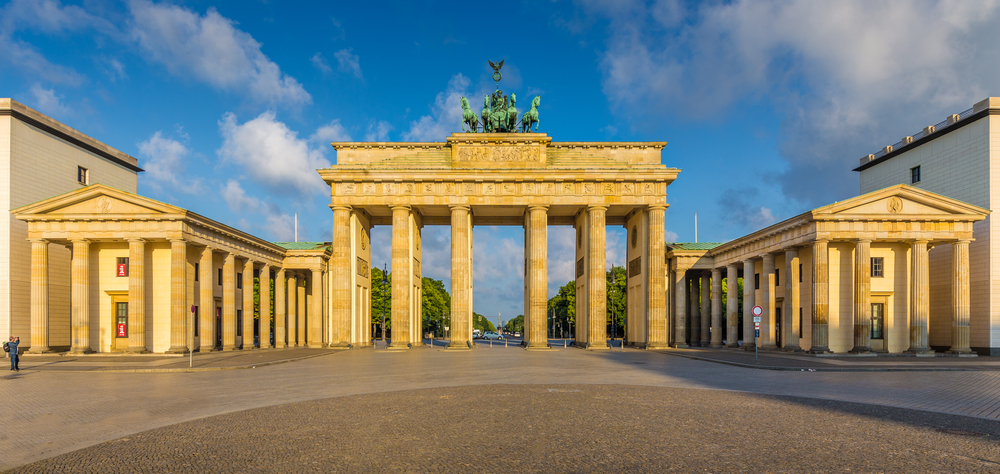The end of this week, October 3, marks the thirtieth anniversary of German reunification following the fall of Communism. It’s known as German Unity Day, but it might as well be called German Freedom Day, for it marked the rebirth of freedom for millions of East Germans who had suffered under the oppression of the Soviet bloc.
I was in Germany in the fall of 1991, just a year after reunification. The wounds of Communism still marred the landscape. As my brother and I crossed what had been the border between West and East Germany, the contrast between the two nations—and the two political and economic systems—was clear, even on superficial observation from a train-car window. The prosperity and orderliness of West Germany gave way to the bleakness of the East.
In Berlin, we stood and gazed at the Brandenburg Gate. This was the city where John F. Kennedy had affirmed American solidarity with a free Germany by declaring, “Ich bin ein Berliner.” It was the very spot where Ronald Reagan had grabbed and shaken the tottering Soviet Empire with his command, “Mr. Gorbachev, tear down this wall!” It was the place where, in the recent past, jubilant crowds had celebrated the destruction of the Berlin Wall—and, a while later, cheered again as Germany was reunited.
The Berlin Wall, the monumental symbol of the divide between West and East, between freedom and tyranny, was gone by 1991. But “no man’s land,” was still there, a haunting testament to the division that generated a 45-year-long Cold War. As we looked across the hundred-yard wasteland between the two halves of the city, we reflected on the lives lost in the quest for freedom. “Give me liberty or give me death,” was the famous cry of the American patriot Patrick Henry. Here, hundreds of East Germans had put that binary into stark relief, risking death by scrambling over barbed wire and across the neutral zone patrolled by snipers and machine gunners. Many of them never made it.

At the Checkpoint Charlie Museum, we learned about the myriad methods devised by East German refugees to attempt escape from government oppression. We marveled at the desperation that would drive people to such reckless enterprise. We pondered the human thirst for freedom. The aspiration voiced by Patrick Henry was not a peculiar, late-eighteenth century American phenomenon. It was a universal longing.
The professor of German at the university where we were studying was a witness to that longing. She had snuck out of East Germany in the engine compartment of an automobile many years before. The burn scars she bore seemed a small price to pay for freedom.
Unfortunately, totalitarianism is never without its defenders. The state’s oppressive hold over its citizens has a silver lining: the abdication of responsibility. German chancellor Angela Merkel, who grew up in East Germany, explained why many East Germans had trouble adjusting to life in the new Germany: “The efforts of freedom, to have to decide everything, have to be learned.” For some, the old way was easier, she noted: “Life in the GDR was sometimes almost comfortable in a certain way, because there were some things one simply couldn’t influence.”
Perhaps this explains why a poll of East Germans twenty years after the opening of the Berlin Wall found a majority saying life was better under Communism. In part, this was due to the abuses of the East German regime already fading from memory for a younger generation; in part it was nostalgia for a system that promised greater equality in return for diminished freedom. “The people who live on the poverty line today also lack the freedom to travel,” one young German observed, equating lack of financial means for some within a market system with the legal restrictions that Communist governments imposed.
Yes, freedom does entail responsibility, and that can be uncomfortable, disconcerting, even burdensome. But the alternative—subservience and dependency—is dehumanizing. The American ex-slave and abolitionist Frederick Douglass understood this. “To enslave men, successfully and safely,” he said, “it is necessary to have their minds occupied with thoughts and aspirations short of the liberty of which they are deprived. A certain degree of attainable good must be kept before them.” Germans who look back on Communism with admiration are focused on a minimal “attainable good” and fail to appreciate the cramping of the human spirit—the stunting of “thoughts and aspirations”—that the deprivation of liberty causes.
“The totalitarian world produces backwardness because it does such violence to the spirit,” Reagan said during his 1987 Berlin speech, “thwarting the human impulse to create, to enjoy, to worship.” That truth is at the heart of the difference between freedom and tyranny. May the German people—and all of us—ever remember it.


